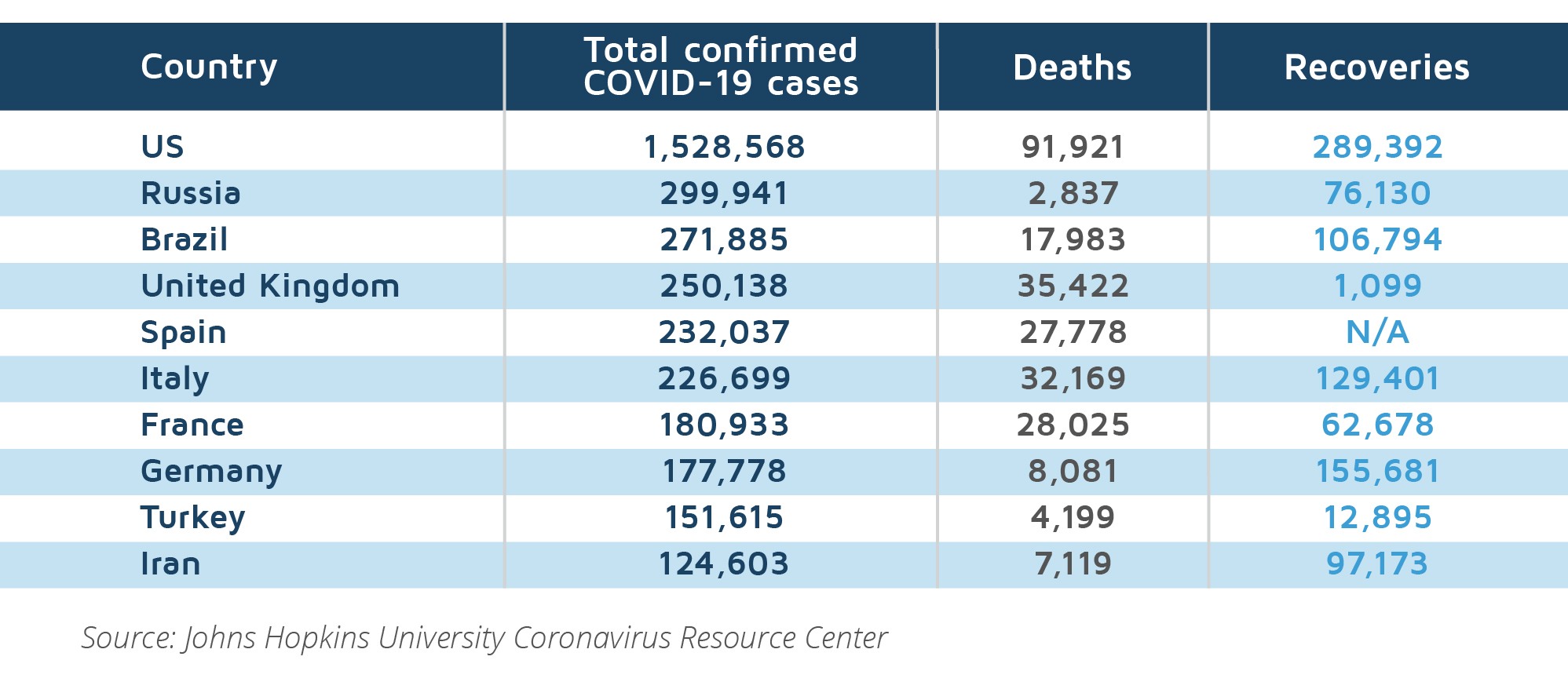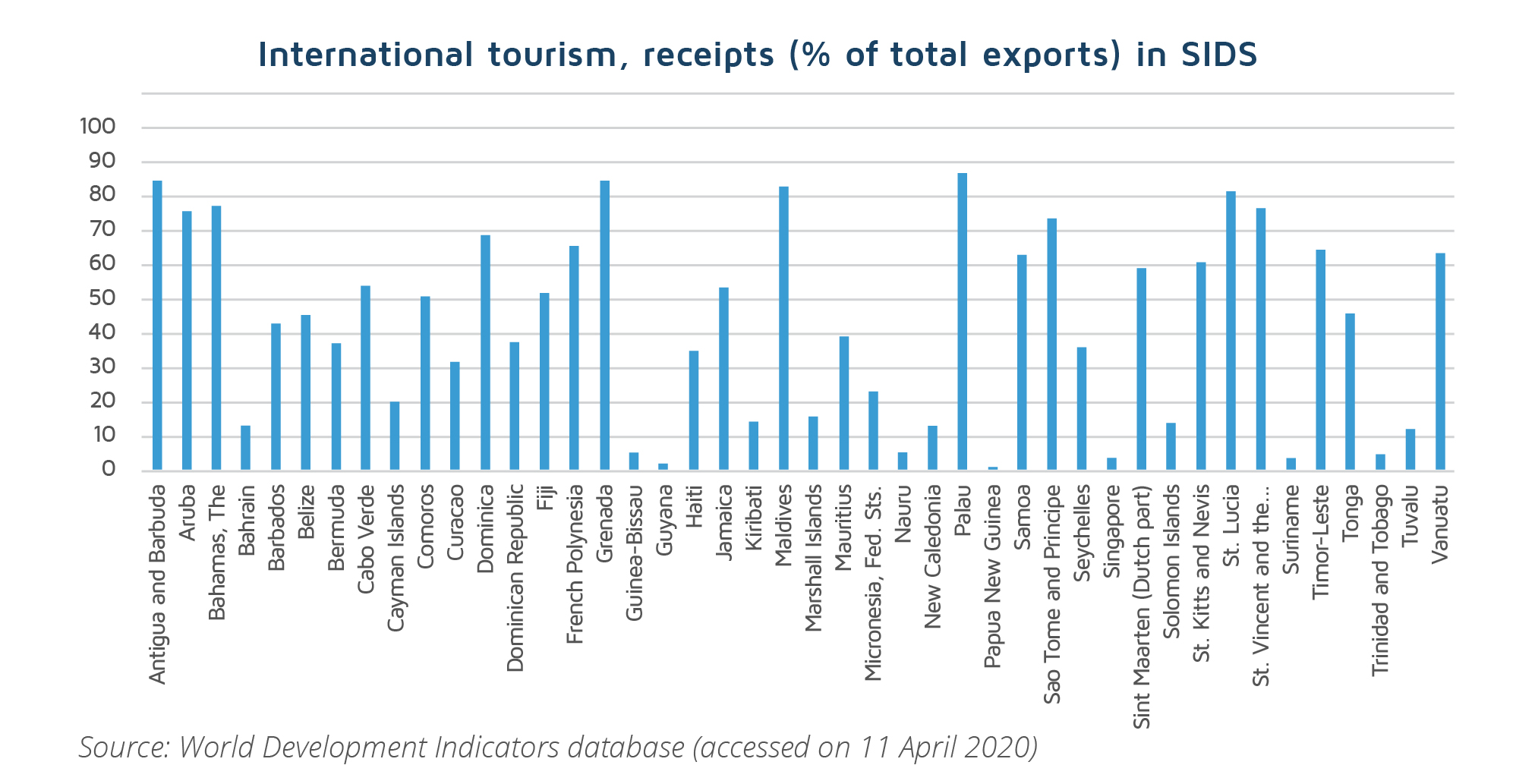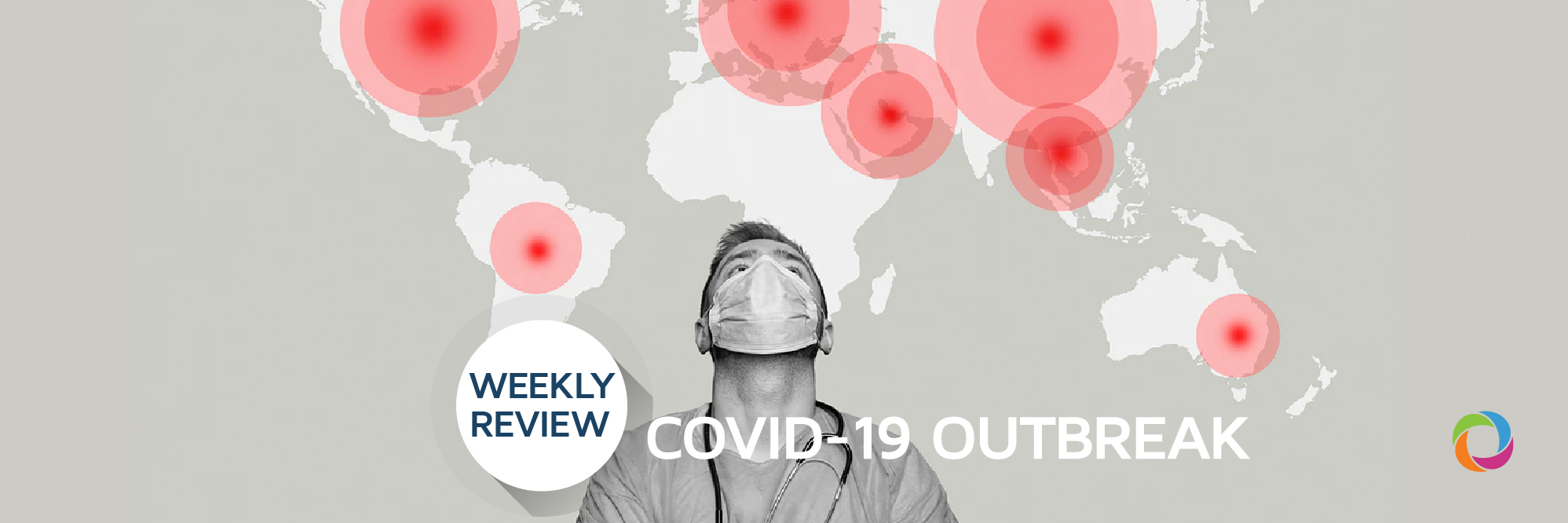(May 14 – 20, 2020)
A record 100,200 new COVID-19 cases were registered on May 15 across the world, according to Johns Hopkins University Coronavirus Resource Center. Adding these grim statistics to the global number of confirmed cases so far reported puts the world close to the 5 million mark. Since the first reports of the virus first emerged in late 2019, 1.7 million people have recovered (over 35% of the total number) while nearly 323,000 (almost 7%) have died in their struggle to fight the virus.
The top 10 countries with the highest number of recorded COVID-19 cases currently account for 70% (3.44 million) of the number of patients worldwide.
10 countries with the most cases of COVID-19 reported, May 20, 2020:

Global ceasefire struggle
Despite the commitment to tackle the COVID-19 pandemic and the billions of dollars allocated to fight the virus and its consequences, internal state interests seem to prevail in one of the most serious international problems – conflicts. Last week, the international community completely failed to forge a global ceasefire in order to concentrate on stopping the coronavirus and save millions of lives. According to the “Conflict in the time of Coronavirus” report issued by Oxfam, despite UN Secretary-General Antonio Guterres’s call for a global ceasefire, conflict continues, leaving many communities exceptionally vulnerable to COVID-19.
Because of these conflicts, millions of people are trapped in war-zones where health systems are paralyzed, have been bombed or are ill-equipped. Many of those affected have fled to crowded camps where conditions are rife for the virus to spread.
According to a press release issued by Oxfam, the failure to adopt the resolution of a global ceasefire was due mainly to the US preventing it from moving forward, “largely because it urged support for the World Health Organization, which the Trump administration has publicly criticized and defunded”. A new resolution for a ceasefire in various conflict zones around the world was submitted to the UN Security Council on May 13th by Germany and Estonia in the hope that peace and international cooperation would prevail over limited interests.
People’s Vaccine
Another important appeal to join efforts and cooperate against the coronavirus emerged from an open letter signed by 140 world leaders and experts. The letter demanded that all vaccines, treatments and tests be patent-free, mass produced, distributed fairly and made available to all people, in all countries, free of charge. It warns that currently the world cannot afford monopolies and competition to overshadow the priority of saving lives.
The initiative, coordinated by the joint United Nations Program on HIV/AIDS (UNADIS) and Oxfam, calls for concrete commitments to ensure that the future vaccine is made affordable and available to all in the shortest possible time.
Tourism Vs COVID-19
Tourism is among the hardest hit of all the economic sectors. According to the World Tourism Organization (UNWTO), international tourist travel could decline by 80% in 2020. This is likely to translate into a drop in revenues for destination countries of between US$910 billion to US$1.2 trillion and put 100-120 million jobs directly at risk.
Women working in the tourism industry in the Small Island Developing countries (SIDS) are in a particularly perilous situation. With 100% of worldwide destinations having been the subject of travel restrictions since April 2020, many female employees may lose their jobs and the source of income.
For SIDS, bringing tourism-related activities to a standstill is expected to result in devastating consequences. Tourism provides more than half of the total export revenue in 20 SIDS and more than 30% in 29 SIDS, according to the United Nations Conference on Trade and Development (UNCTAD).

Women account for the majority of employees in the tourism industry, being involved in the accommodation and food sectors which are the core tourism related economic activities in 20 out of 28 SIDS. The economic contraction of the sector caused by the COVID-19 pandemic and the subsequent job losses are likely to hit women the hardest in SIDS.
Last week, the UNWTO released a Tourism Recovery Technical Assistance Package to offer guidance to member states in response to COVID-19. The package covers three main aspects: economic recovery, marketing and promotion and institutional strengthening and resilience building.
NGOs and charities on the front line in the fight against COVID-19
The United Kingdom’s Department for International Development (DFID) has announced that 40 charities and NGOs will receive funding from either its £20 million humanitarian support package, announced last month, or from its £100 million global hygiene partnership with Unilever. According to a press release issued by the organization, British charities such as Humanity & Inclusion, Action Against Hunger, CARE and Christian Aid have received funding from DFID’s £20 million humanitarian package which will provide healthcare, water and sanitation, food and shelter to meet the basic needs of some of the world’s most vulnerable people including those in Yemen, Afghanistan, Somalia and Africa’s Sahel region.
From 18 May 2020, up to £30 million of new grants have also been made available to small and medium-sized UK charities through the next round of the UK Aid Direct program. Each charity will be able to bid for a grant up to £4 million for any program that focuses on tackling the coronavirus crisis.
International Development Secretary Anne-Marie Trevelyan, said:
“These organisations are often best placed to help those most at risk and are crucial to slowing the pandemic’s spread in the developing world. This in turn helps reduce the risk of future waves of infection globally, which could otherwise come to the UK.”
DFID is providing £145 million for UN coronavirus appeals including £75 million for the World Health Organization, £20 million for UNICEF, £5 million to Education Cannot Wait, £20 million for the UN Refugee Agency (UNHCR), £15 million for the World Food Programme and £10 million for the UN Population Fund (UNFPA).
Stay tuned for the next DevelopmentAid Coronavirus weekly review to be released on May 27, 2020.
DevelopmentAid offers its members access to complete coverage of the international development sector during the COVID-19 pandemic. Until May 31, all COVID-19 related tenders and grants are publicly available without any restrictions, at this link.
About COVID-2019 Coronaviruses are a large family of viruses that are common in many different species of animals including camels, cattle, cats and bats. Rarely, animal coronaviruses can infect people and then spread between them such as was the case with MERS (2012) and SARS (2003).The symptoms of the virus are very similar to those of a common cold – runny nose, headache, cough, sore throat, fever, a general feeling of being unwell. Blood tests are necessary in order to prove the presence of the virus in the organism. Named by scientists as the “Wuhan seafood market pneumonia virus”, COVID-19 is a coronavirus, like MERS and SARs, all of which have their origins in bats. Initial reports show that, in the early stages of the outbreak (early January 2020), many of those infected in Wuhan had some link to a large seafood and live animal market – the Huanan Seafood Wholesale Market, mainly its western wing where wildlife animals are traded. This suggests that the virus initially affected an animal and subsequently spread to a person in a what a CDC has called “the species barrier jump”.


